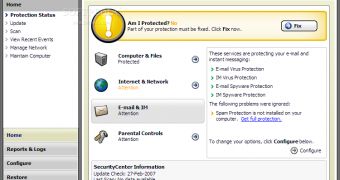Security vendor McAfee has announced a deal with Cox Communications today, which is the third largest US cable television provider, that is meant to protect all the Cox High Speed Internet clients. Obviously, the two companies attempt to reach this goal through McAfee's Security Suite, which will receive a co-branded name following the partnership. The new Cox Security Suite, powered by McAfee, will be officially rolled out, in the first months of 2008, and will include several utilities powered by the Santa Clara based company.
"We recognize that safe and secure high-speed Internet access is critical to our customers, and we pride ourselves on offering powerful PC and online protection from viruses, hackers and spyware at no extra cost," said Ray Starbird, director of product development for Cox. "Our new security offering powered by McAfee will enable consumers to do everything from surfing the Web to shopping online with much greater peace of mind."
Among the utilities included in the Cox Security Suite, I can mention McAfee VirusScan Plus, McAfee Privacy Service and McAfee SiteAdvisor. While VirusScan Plus is a technology supposed to block all infections (Trojans, malware, spyware, rootkits and other types of threats), the Privacy Service is targeting the parents who want to limit the access of their kids to certain websites. This way, the Cox customers will be able to protect their children and block the content rated as inappropriate. SiteAdvisor is a famous technology, powered by McAfee, intended to block spam, phishing attacks and other type of web-based scams.
"Cox Communications is not only a leader in their field, they have demonstrated a strong commitment to customer education," said Todd Gebhart, senior vice president and general manager of McAfee Consumer, Mobile and Small Business. "The recently released National Cyber Security Alliance online security study showed more than 90 percent of consumers think they are protected against online threats, while less than half actually have sufficient protection", he concluded.

 14 DAY TRIAL //
14 DAY TRIAL //